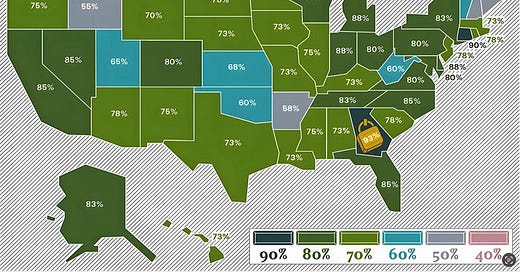I never understood the idea of not locking your doors at night. I like the idea; I like all the assumptions that undergird the notion of trust and security. It’s like saying “oh, we never put spikes tipped with a fast-acting poison in the fireplace before turning in,” because why would you? No one’s coming down the chimney to rob you. This isn’t New York City, where you always hear stories of people who are duct-taped and beaten by slender sooty thieves who have slithered down the flue. I don’t know how people live like that!
Of course, if you did put poison-tipped spikes in your fireplace in New York, and some burglar ended up impaled and unalived, you’d be liable. The New York Post would say:
“Bernice and Samuel X. Gumpers, life-long residents of Astoria, had been burglarized 97 times in the last two years, often by the same man, a career criminal who has been arrested 3,136 times. He is currently accused of blowing up a segment of the Brooklyn Bridge, but was out on bail at the time he allegedly revisited the Gompers resident by his accustomed method. This time, however, had not counted on a phalanx of steak knives dipped in the Amazonian poison curare, stuck upright in some logs. Police arrested the couple after removing the body, charging them with willful misuse of cutlery.”
Locking your door doesn’t say you don’t trust your neighbor. I trust my neighbors. I trust just about everyone in a ten-block radius. Outside of that, there be dragons. I could flop on my neighbor’s front yard with a hundred-dollar bill pinned to my lapel and he would not only revive me, but iron the bill to remove any wrinkles. In Fargo we locked our doors, though, because my father was neither stupid nor lazy. The lock wasn’t something that would trouble the motivated miscreant, but I think he figured that if he heard someone breaking the front door with force or even jiggling the tumblers, he would have time to get the pistol from the sock drawer. I was taught from an early age: lock the door, because why on earth wouldn’t you? Crime may be low, the streets safe, the social contract intact, the police swift and brisk, but that doesn’t mean you oughtn’t turn this little brass nipple a quarter-turn to the right.
It didn’t make a sound, but it settled into a particular position that said: you’re safe.
The annoying thing about these state-by-state maps ignores the regional similarities that straddle the border. It’s not as if everyone in Fargo throws the portal open and everyone across the river in Moorhead double-bolts. People in Fargo lock, but North Dakota is not just Fargo. There are towns in the prairie where no one has locked for years, because there’s just no one else around. You don’t need a doorbell because you can see people coming a long time before they get there - a plume of dust in the distance, then the sound of a car crunching up the gravel driveway. More than enough warning to get the coffee pot on or the shotgun down, depending on whether you recognized the vehicle. No, Henry, put it away, that’s the Hermans, I told you, they bought a new Dodge.
There was probably an uptick around the time “In Cold Blood” came out, though. It seems likely the rural imagination was infected by idea of nihilistic duos roaming the dark roads in search of a farmhouse. But it passed, and people went back to relying on the farm dog to raise an alarm.
“What’s he making a racket about, Henry?”
“Probably just a deer. Unlikely it’s anyone about whom Truman Capote would craft a gripping narrative with an elegiac quality that found the hard poetic quality of life, and death, on the plains.”
“I suppose you’re right. Those two boys in town at the store who seemed to be listening when I was talking with Edna about how I wish you’d put the money in the bank instead of the cashbox under the bed, they were probably just passing through.”
Bottom line: it’s hardly any effort to lock your door, and dissuades the wandering ne’er-do-well who lacks picks and tools, but spends the dark hours wandering around the neighborhood jiggling handles. And it doesn’t hurt to have a Ring camera, either, so you when the police say they’re busy and don’t have time to look for the guy, they know exactly who they’re not looking for.






Next, let's do car doors. I had a friend who refused to lock hers, saying a professional car thief can take any car he wants; locks wouldn't stop him, and forcing him to break the locks would simply damage your car. I told her while that may be true, a professional car thief is not interested in your nine-year-old mid-sized sedan; your big concern should be joy-riding teens or junkies who sell to chop shops, both of whom commit crimes of opportunity -- opportunities which are lessened by a simple lock.
Of course, I was raised in Chicago, where we lock our car doors even when parked inside our locked garages. Because, why wouldn't you?
I lock my doors during the day when I'm home, as well as at night. Criminals who are willing to hurt you don't care what time of day it is. Better to have a few extra seconds to arm yourself as they batter down the door.